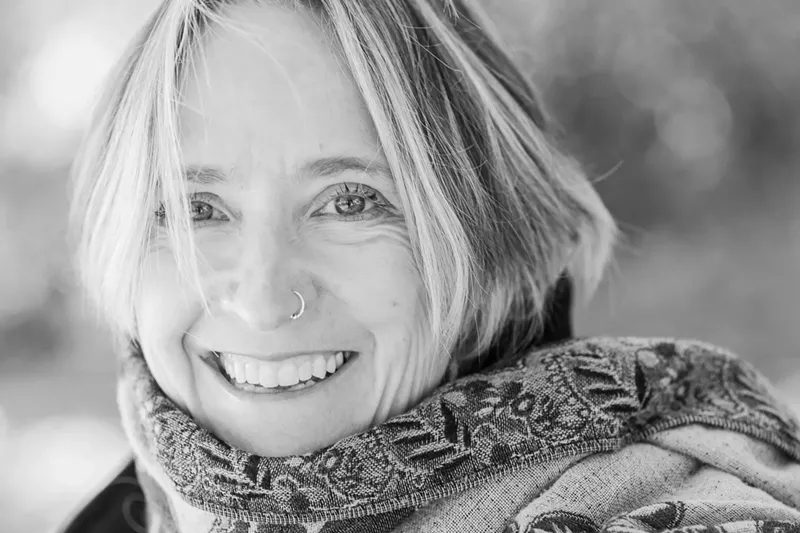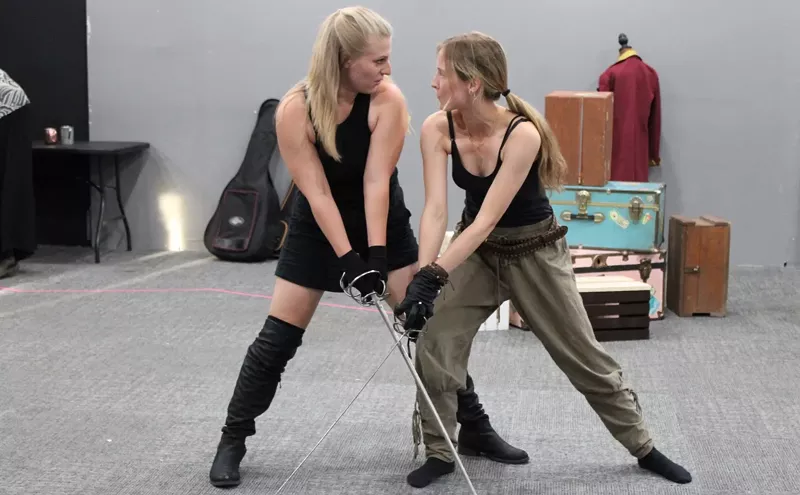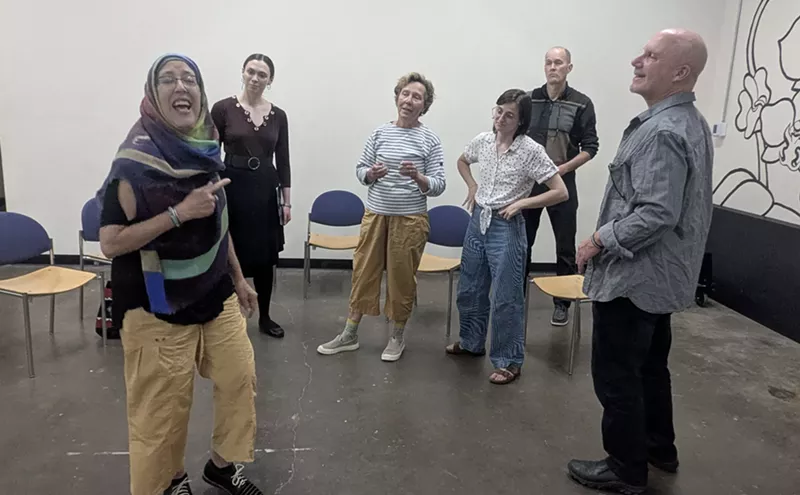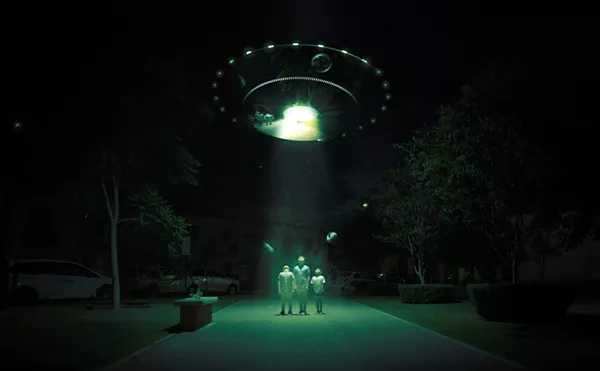When a prize-winning Colorado poet turns to prose and writes a novel, you can expect something unusual. Kika Dorsey is the author of a chapbook and three books of poetry, one of which — Occupied: Vienna Is a Broken Man & Daughter of Hunger — won the Colorado Authors League award for best collection in 2021. Dorsey has just released her first novel, As Joan Approaches Infinity.
Joan first appeared in a series of short stories; comic, rueful, deprecating, each is a prickly shaft of perhaps slightly twisted insight. These stood on their own as Dorsey released them one by one on social media and other outlets. And now they have been linked into a narrative, with Joan at the center. When Dorsey is asked how it felt to plunge into fiction after years dedicated to poetry, and what the intention was behind this particular novel, she admits that the move "was unintentional."
“I wanted to write some short stories. I’d published some, but never saw myself as a prose writer," she explains. "I’m still going through the transition. Poetry is part of my body. I wake up early. I write a lot of poetry. I identify with it deeply. Fiction? Oh, I’m going to give myself a new challenge. It’s harder for me. I’m not that great with narrative arc. With poetry, you just want to go with association. I’m happy with this book, but it doesn’t come as easily as poetry does. There was actually a bridge. Occupied has a lot of characters, one after another. With fiction, I love that you can develop characters. With poetry, it’s harder to do that."
However, Dorsey says she did use "poetic techniques" such as "associative thinking" for the character Joan. "I get in her head, and she’s making all kinds of wild associations and also has dreams," she says. "And her dreams — I think they add dimension and they add poetry.”
Joan is one of the more interesting protagonists readers are likely to encounter, both transparent and inscrutable. She’s often infuriating — foolish, irrational, self-destructive — to the point where you want to take her by the shoulders and shake her. Hard. At other times, you identify with her, and sometimes feel genuinely fond of her.
“I think about this novel a lot,” Dorsey says. “I talk about this novel in my head. Joan has some of my autobiographical background: I had a schizophrenic father who committed suicide, and I managed my mother’s care when she had Alzheimer's.” Like her creator, Joan has two children and is an adjunct professor in literature and creative writing.
“I took myself and fictionalized a character who has no superego, no filter,” says Dorsey. “She is incredibly impulsive and self-absorbed. Also, she feels she’s sacrificed so much for her family and she’s invisible.
"There’s a passage in the book in which a magician opens a coffin and the woman inside has disappeared,” she continues. “It’s a metaphor for how women, especially middle-aged women, are invisible in our society. Joan raised her children and struggled in a low-paying job in education. She couldn’t do daycare; she wouldn’t be able to even afford daycare.”
She adds, “I have lived in a society that’s definitely Apollonian — Apollonian versus Dionysian, patriarchal. Joan is pure Dionysus, always looking for the next high. She doesn’t give a shit about law and order. She’s transgressive. She’s Bonnie and Clyde without Clyde. Yes, I have done some stupid things. I’ve lived a relatively marginal life; I’ve been caught up in the criminal justice system."
While Dorsey says "a lot in the second half of the book is less autobiographical," she notes that “As Joan Approaches Infinity is a way of taking some of my bitterness and turning it into humor. All those Joan stories that turned into the novel occurred while I was working on a book about post-war Austria and exorcising grief about my mother, who had died. That was a dark book, serious, and it took a lot of research. Writing Joan was liberating.
“It’s hard for my family," she adds. "I dedicated the book to them. I was nervous about my husband reading it. Still, they do recognize it’s fiction.”
The structure of Dorsey’s novel is original and unexpected. It does not have the kind of narrative arc readers tend to expect. The most dramatic event — a fire that consumes Joan’s home — happens about three-quarters of the way through, but it’s not really treated as a climax, and there’s no following denouement. If you’re hoping, as I admit I half was, to see Joan come to some kind of self-realization, if not piercing insight, she doesn’t. She just continues on her blind and sometimes dippy way. No transcendence. No forgiveness. Just life.
This is deliberate. What Dorsey had in mind for the structure were spiral waves.
“When I was in graduate school, I dealt with nonlinear narratives and experimental poetry,” she explains. “My Ph.D. was all about shapes of narratives. There isn’t a traditional arc here. Joan is always going for the next thing, starting over, and then she falls back down. The next chapter, she’s on the bottom again. It’s a wave. There is growth but also repetition.”
Joan drinks heavily, but “I’m not going to follow the trope of addiction that America loves: You become sober and all of a sudden your life is better,” says Dorsey. “She definitely gets better, but I play with tropes and refuse to give people those formulas.
“Sometimes I felt bad when I was writing this book. I would think, 'How can I torture Joan again?' An old friend said the book is very complex, and his favorite chapter is where she’s bowling. In that chapter, she’s finally good at something, not failing, and I wanted to make it something absurd like bowling," she says.
“I knew that I wasn’t going to make it redemptive. I don’t think life is like that. Fiction, in a way, is our way of staving off death. I do love that arc, and we all crave resolution, but I don’t think our society deserves happy endings. We need to acknowledge what’s going wrong. And also, individuals don’t grow in a linear fashion. I took the formulas I know and I undermined them.”
As Joan Approaches Infinity can be ordered on Amazon and at gesturepressandjournal.com. Dorsey will do a reading at 7 p.m. Thursday, August 10, at Stella’s Coffee Haus, 1476 South Pearl Street, with poets Shannon Hardwick and Elizabeth Strauss Friedman. She will also read at the Indie Author & Press Bookfair at Counterpath, 7935 East 14th Avenue, at 10:30 a.m. Saturday, September 30.

Audio By Carbonatix
[
{
"name": "GPT - Billboard - Slot Inline - Content - Labeled - No Desktop",
"component": "23668565",
"insertPoint": "2",
"requiredCountToDisplay": "2"
},{
"name": "STN Player - Float - Mobile Only ",
"component": "23853568",
"insertPoint": "2",
"requiredCountToDisplay": "2"
},{
"name": "Editor Picks",
"component": "17242653",
"insertPoint": "4",
"requiredCountToDisplay": "1"
},{
"name": "Inline Links",
"component": "18838239",
"insertPoint": "8th",
"startingPoint": 8,
"requiredCountToDisplay": "7",
"maxInsertions": 25
},{
"name": "GPT - 2x Rectangles Desktop, Tower on Mobile - Labeled",
"component": "24956856",
"insertPoint": "8th",
"startingPoint": 8,
"requiredCountToDisplay": "7",
"maxInsertions": 25
},{
"name": "Inline Links",
"component": "18838239",
"insertPoint": "8th",
"startingPoint": 12,
"requiredCountToDisplay": "11",
"maxInsertions": 25
},{
"name": "GPT - Leaderboard to Tower - Slot Auto-select - Labeled",
"component": "17676724",
"insertPoint": "8th",
"startingPoint": 12,
"requiredCountToDisplay": "11",
"maxInsertions": 25
}
]












